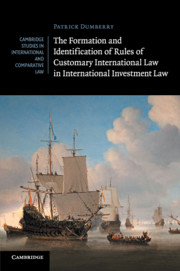Book contents
- Frontmatter
- Dedication
- Contents
- Foreword
- Preface
- Acknowledgments
- List of abbreviations
- Introduction
- 1 The concept of customary international law
- 2 Dancing with the sources: the fascinating story of the relative importance of custom and treaties at different times in the evolution of international investment law
- 3 State practice
- 4 Opinio juris
- 5 The fundamental importance of customary rules in international investment law
- General conclusion
- Bibliography
- Index
- cambridge studies in international and comparative law
General conclusion
Published online by Cambridge University Press: 05 May 2016
- Frontmatter
- Dedication
- Contents
- Foreword
- Preface
- Acknowledgments
- List of abbreviations
- Introduction
- 1 The concept of customary international law
- 2 Dancing with the sources: the fascinating story of the relative importance of custom and treaties at different times in the evolution of international investment law
- 3 State practice
- 4 Opinio juris
- 5 The fundamental importance of customary rules in international investment law
- General conclusion
- Bibliography
- Index
- cambridge studies in international and comparative law
Summary
This final chapter summarizes this book's main findings.
The remaining fundamental importance of custom in the present age of ‘treatification’
The fascinating story of the two main sources of international law (custom and treaties) and their changing relative importance at different times in the evolution of international investment law has provided the perfect backdrop to the present book. Customary rules first played a predominant role. In the early twentieth century, the concept of the ‘minimum standard of treatment’ and the general prohibition against expropriation without compensation emerged as the two main sources of international law obligations for States.
The customary nature of these principles was met with contestation by non-Western States at different phases in the evolution of international investment law. For instance, the 1960s and 1970s were marked by serious and continuing challenges to the very existence of these two rules by a large segment of States, including those which emerged from colonialism. In the 1980s, many developing (and socialist) States believed that the absence of consensus on existing basic legal protection had in effect prevented the development and crystallization of rules of customary international law in the field of international investment law. Other (mainly developed) States held the view that while such customary rules existed, their effectiveness was limited due to the vehement opposition by a large number of States. As a result, the foundation of these two rules as the basic set of legal investment protection for investors doing business abroad was severely weakened. In any event, at the time all States could agree on the obvious fact that the few rules that were said to exist did not in fact provide any solid legal protection for investors doing business abroad.
These events marked a defining moment in the history of investment law, notably the decline of the importance of customary rules as the main source of investment protection for foreign investors.
The prevailing uncertainties surrounding the nature and scope of existing rules on investment protection led States to begin signing BITs en masse. This phenomenon was accentuated by the climate of the early 1990s, which was marked by globalization. At the time, a newly found consensus emerged amongst States regarding the necessity to offer better legal protection to foreign investments in order to accelerate economic development.
- Type
- Chapter
- Information
- The Formation and Identification of Rules of Customary International Law in International Investment Law , pp. 406 - 424Publisher: Cambridge University PressPrint publication year: 2016



